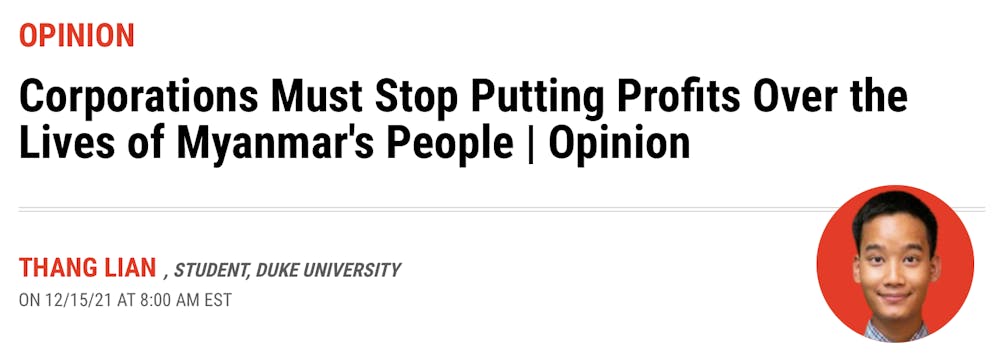In 2008, Thang Lian, then six years old, was forced to flee Myanmar with his family from the military and religious persecution.
“A small percentage of the people in Myanmar practice Christianity, which is what my family practices, and because of the religious persecution against the Chin people, which is my tribe, we had to flee,” said Lian, a first-year at Duke.
Lian still remembers much of the harrowing experience—the escape route included a network of secret routes from Thailand to Malaysia and calls with the United Nations to live with host families in the United States.
Over a decade later, he watched as protests brought deadly conflicts between civilians and Myanmar’s military, also known as the Tatmadaw. Disappointed and saddened by the lack of news coverage, he wrote an article in Newsweek about how foreign countries can help the people of Myanmar.
As a refugee, Lian believes it is his duty to support his people and raise their voices.
“The people of Myanmar, in their own ways, have persisted, resisted and started movements that need global attention, that require and necessitate global solidarity and support,” he said.
In the article, Lian advocates for companies to cease their operations in Myanmar. He focuses on the Andaman Sea region for its lucrative oil-rich seabeds, with companies such as Chevron and France’s TotalEnergies SE previously using it for offshore drilling. As stated in his article, the Tatmadaw earned at least $120 million in taxes from this region alone.
Lian also points to Thailand’s oil and gas company PTT, Hilton Worldwide Holdings, Shangri-La Hotels and Resorts, Suzuki Motor Corporation and British American Tobacco as other top financial contributors to the Tatmadaw. Ceasing these operations and rewriting these business systems will subsequently cut off the Tatmadaw from the money that funds their human rights abuses, Lian argues.
“I think that what we need is a dismantling [of the system]. Because the [current] system is corrupt, a system like that has supported the mass murder of thousands of people,” Lian said.
Lian points to the BURMA Act, a piece of legislation introduced in the Senate last October, as a strong beginning for such action against the Tatmadaw. If implemented, it would denounce American ties to the region while also providing humanitarian aid. Lian supports groups advocating for the act’s passage.
“One of the organizations is called Global Movement for Myanmar Democracy, and their main goal is to raise awareness. They have so much information on their website and their social media pages, and how people can start to pressure their own Congress members to have this legislation passed,” he said.
While Lian is hopeful for the BURMA Act, he believes the American government can take more action.
“We know from past experiences how powerful words can be, but also action is needed.”
At Duke, Lian believes that becoming involved in mutual aid is a powerful way to support Myanmar from overseas. With countless civilians laid off from work, many have started mutual aid funds to promote the Civil Disobedience Movement.
They’ve also worked to counter mainstream media’s portrayal of the people of Myanmar as helpless, powerless citizens.
“[The American media] doesn’t necessarily focus on the work of the activism that is happening on the grounds—people my age, our age, are going out every single day risking their lives, to protest against the military,” Lian said.
Lian hopes to return to Myanmar some day to advocate for better access to quality education for the youth of Myanmar, with many losing up to three years of schooling due to COVID-19 and civil unrest.
“Education is one of the main ways that people in Myanmar are able to climb up the social strata,” Lian said.
Get The Chronicle straight to your inbox
Signup for our weekly newsletter. Cancel at any time.

